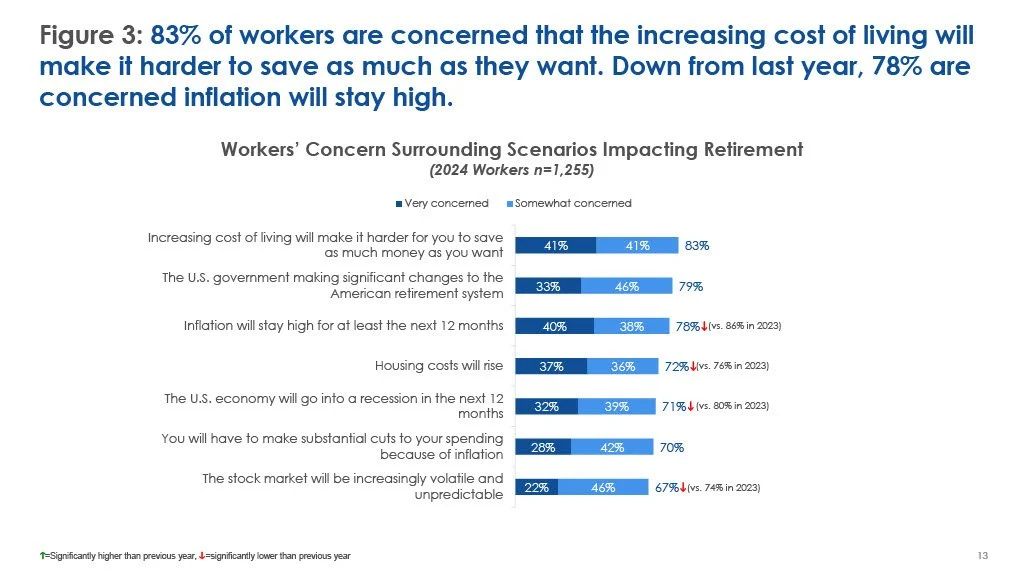Navigating Retirement Confidence: Insights from the 34th Annual Retirement Confidence Survey
Retirement is often portrayed as a time of leisure and enjoyment, but how confident are individuals about their financial security as they enter this phase of life? This blog post discusses the findings of the 34th Annual Retirement Confidence Survey (RCS), conducted by the Employee Benefit Research Institute (EBRI) and Greenwald Research. Despite some skepticism about the reliability of personal sentiment surveys, the RCS has provided valuable insights into retirement perspectives over the years.
One notable finding is the gap between perceived retirement confidence and actual preparedness. While a significant portion of workers and retirees express confidence in their retirement finances, many have not made efforts to assess their retirement needs or savings realistically. Despite this disconnect, retirees generally report being able to spend money as they wish, even if their expenses are higher than expected.
Interestingly, retirees tend to report higher satisfaction with their retirement lifestyle than expected, with a majority feeling they are living the retirement they envisioned. However, the article notes that confidence in retirement often correlates with factors like stock market performance rather than actual savings.
The article suggests several steps for improving retirement confidence, including participating in employer-sponsored retirement plans, using retirement needs calculators, consulting with retirement plan advisors, and having a comprehensive retirement plan.
Key Takeaways:
Perceived Confidence vs. Preparedness: The RCS reveals a significant gap between perceived retirement confidence and actual preparedness. While many express confidence, few have taken concrete steps to assess their financial needs realistically.
Resilience in Retirement: Despite facing higher-than-expected expenses, retirees demonstrate resilience in managing their finances during retirement, indicating adaptability in navigating financial challenges.
Importance of Planning: The survey highlights a concerning trend of lacking proactive planning among those nearing retirement age. A more informed and deliberate approach to retirement planning is crucial.
Unveiling Realities: The RCS uncovers an intriguing gap between retirees' expectations and their actual experiences in retirement. While many retirees find their expenses higher than anticipated, they still report being able to manage their finances reasonably well. This resilience highlights the adaptability of retirees in navigating financial challenges during retirement.
Challenges in Preparation: A concerning trend highlighted by the survey is the lack of proactive planning among those nearing retirement age. Many admit to not having made any attempt to understand their retirement needs, relying instead on guesswork. This emphasizes the need for a more informed and deliberate approach to retirement planning.
Meaningful Quotes:
"Two-thirds (68%) of the workers and three-fourths (74%) of retirees surveyed were very or somewhat confident about having enough money to live comfortably in retirement—unchanged from a year ago."
"While over half of retirees say their overall expenses in retirement are higher than they originally expected, nearly 4 in 5 say they are able to spend money how they want, within reason."
"People consistently report that they haven’t made even a single attempt to figure out what their retirement needs will be—and among those who have been 'guessing' remains a popular response."
Practical Steps Towards Confidence: To bolster retirement confidence, individuals must take concrete steps. This includes participating in employer-sponsored retirement plans, utilizing retirement needs calculators to assess financial requirements, seeking guidance from retirement plan advisors, and formulating comprehensive retirement plans tailored to individual needs and goals.
In conclusion, the Retirement Confidence Survey offers valuable insights into retirement preparedness and confidence levels. By acknowledging the realities of retirement planning and taking proactive steps to enhance confidence, individuals can better position themselves for a fulfilling and financially secure retirement. Remember, confidence in retirement isn't just a sentiment—it's a reality achievable through informed decision-making and strategic planning.


